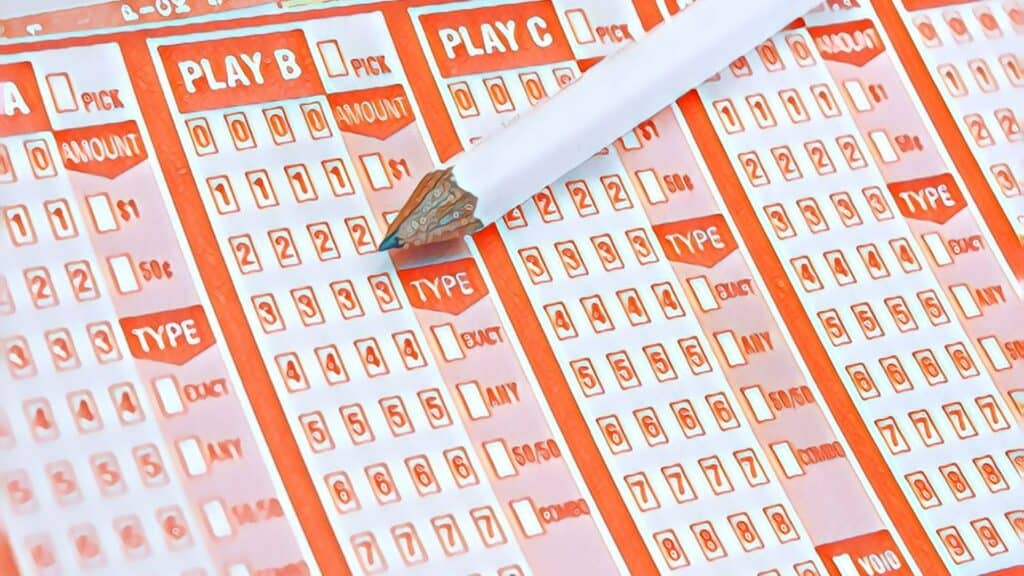LISTEN TO THIS ARTICLE
Key Takeaways:
- The allure of instant Powerball wealth is overshadowed by the sustainable, long-term financial growth afforded by real estate investing.
- Real estate investing fosters economic stimulation, community development, and offers advantageous tax benefits, unlike the fleeting economic impact of Powerball.
- Real estate investing provides a solid foundation for building a lasting legacy, empowering generations with financial literacy and tangible assets.

Powerball Lottery Dreams vs. Real Estate Reality (A Comparative Look into Wealth Creation): Introduction (Lottery Lure and Real Estate Rationale)
In recent years, the allure of instant wealth has continued to captivate the imagination of many.
The idea of winning a mind-boggling amount overnight, especially through lotteries like Powerball, has become a part of modern-day folklore.
Every time the jackpot swells, a frenzied excitement takes over, with people lining up to buy their lottery tickets, each harboring the dream of becoming the next Powerball winner.
Social media platforms like Tik Tok fuel these dreams with viral videos of lottery winners sharing their joy and ostensibly luxurious lifestyles.
On the other side of the spectrum lies the age-old, tried-and-tested avenue of real estate investing.
Unlike the whims of a lottery, real estate investing is grounded in tangibility – bricks, mortar, land – assets that have inherent value.
The year 2023 continues to witness a surge in individuals turning towards real estate as a reliable means to grow and preserve wealth.
It’s a path that requires a blend of knowledge, patience, and strategic thinking, offering a stark contrast to the fleeting chance associated with a lottery ticket.
The stark dichotomy between these two paths towards financial betterment presents an intriguing narrative.
While the lottery, epitomized by games like Powerball, offers a tantalizing promise of an extravagant lifestyle overnight, real estate investing proposes a steadier, more calculated approach to wealth accumulation.
The tales of overnight millionaires may bewilder and entice, yet the enduring allure of real estate investing remains steadfast.
As we delve deeper into the realms of risk, return, and the lasting impact of these financial choices, we aim to provide a well-rounded perspective.
This comparison sheds light on the profound differences between the fleeting chance of wealth through Powerball and the calculated, enduring wealth-building avenue of real estate investing.
In the subsequent sections, we will dissect the elements of risk and return, explore the longevity of investment, and delve into the skill and strategy required in both worlds.
As we navigate through the economic impact, tax implications, and the potential for legacy building, we’ll unfold the narrative of two distinct paths of financial endeavor in the modern era.

Risk and Return (Jackpot Joys vs. Real Estate Rewards)
In the world of wealth accumulation, the allure of winning the lottery is an ever-tantalizing dream for many.
The idea of a single ticket catapulting one into a life of luxury is a narrative well-fed by the media and, often, the state-run lottery system itself.
For example, the 2022 Mega Millions frenzy, where hopefuls from every state flocked to buy a ticket, showcased the enduring appeal of these number games.
RELATED CONTENT
Many fantasize about using such a windfall to buy their dream home, free from the grip of a mortgage or the fear of foreclosure.
On platforms like Reddit, one can dive into anything from winning strategies to heartfelt stories of those whose lives were upended – both for better and worse – by a winning Powerball or Mega Millions ticket.
On the flip side, real estate investing doesn’t hold the same immediate gratification allure but offers a more predictable, and arguably, a better experience in wealth accumulation.
It’s a path less shrouded in the whims of fate and more grounded in knowledge, strategy, and financial planning.
It’s less about a sudden jackpot and more about building a steady stream of income that might not have the dazzle of a million-dollar jackpot but holds promise for a secure financial future.
In a Reddit thread discussing investments, a user from D.C. remarked, “I used to play the lottery every week, imagining that night’s win would solve all my financial problems. When I began to invest in real estate, it felt like a dream slowly materializing into reality. The progress was tangible, and the control was empowering.”
The lottery is a game where the state government is the ultimate winner. In the fiscal year 2021, U.S. lottery sales contributed billions of dollars to the state budget, becoming an important source of revenue generator.
A former FBI agent opined in a Massachusetts State report that the transparency in how the money is utilized may fluctuate from one place to another, making it difficult to extrapolate the benefits to the common man.
In contrast, real estate investing is a more personal affair.
The property you acquire, the rental income you garner, and the community you help improve are all part of a tangible legacy you’re looking to build.
Publications like the monthly newsletter from United States Real Estate Investor help to personalize the journey, offering insights, tips, and a community to engage with.
The argument made by many financial advisors is that every dollar spent buying lottery tickets could be invested elsewhere to better one’s financial standing.
In the long run, the chances of enjoying playing the real estate game, with its ups and downs, are arguably more favorable and less likely to hamper one’s overall well-being.
Unlike the lottery, where outside factors like the privacy policy on claiming winnings, unwanted attention, and the inevitability of dwindling funds without proper financial advisement can stir up a mix and match of complications, real estate investing stands as a trusted partner on the path to financial security.
The whimsical hope of a lottery windfall and the romantic relationship many have with the ‘big win’ contrasts sharply with the pragmatic, steady, and empowering journey of real estate investing.
The latter not only solves financial issues but contributes to a better, personalized, and more controlled approach to wealth creation.
Lottery Fact
The first recorded instance of a lottery dates back to ancient China between 201 and 187 BC, where keno slips were used. These lotteries were likely organized to help finance major government projects, such as the construction of the Great Wall of China.
—
Source: Fact Retriever

Investment Longevity (Lottery Ticket Temporality vs. Real Estate Resilience)
The dream of hitting the lotto jackpot has dazzled many, offering a tantalizing promise of instant wealth.
Yet, the transient euphoria it brings often fades as swiftly as a mirage.
When the U.S. began to legalize lotteries, starting with New Hampshire in 1964, the allure of sweepstakes and raffles surged, making buying tickets a cultural phenomenon.
People often scramble to buy more tickets especially when a zodiac sign deemed lucky is in ascendance or when the jackpot reaches a staggering amount like $1.1 billion.
However, it’s a whiter shade of pale when compared to the enduring wealth potential real estate investments offer.
On every street corner, you may find lottery outlets and keno spots, all tempting the passerby with the possibility of a life-altering win.
The 1 in 292.2 million odds of snagging the Powerball jackpot are, needless to say, not in one’s favor.
Besides, the way to improve one’s odds often revolves around spending more money to buy more tickets—a gamble that rarely pays off in the long run.
This trend, paradoxically, often has people spending money as long as there’s a shimmer of hope in the million-dollar jackpot.
This might be enticing for some, but it’s important to see the bigger picture when it comes to sustainable wealth generation.
On the flip side, real estate investing is a venture where the stakes can be as high, but the risks are substantially mitigated.
It doesn’t promise the quick fortune of a sweepstakes win but offers a steady, growing return over time.
In a place else, away from the flashy lottery billboards, one finds the serene, promising landscape of real estate.
Here, each property acquired is akin to buying tickets to a raffle where the odds are notably in favor, and the prize is a lifetime of financial security.
Historically, the annual return rate of real estate hovers around 5.5%, a statistic that showcases the stable, long-term nature of property investment.
It’s a field where knowledge and strategy have a significant impact, something that is non-existent in the lotto world where ‘accepting all cookies’ or ‘rejecting non-essential cookies’ on a lottery app may play a whimsical role in your fortune.
The benefits of real estate extend beyond mere financial gains.
The peace of mind that comes with owning tangible assets is akin to the relaxation one finds in a sauna—steady and soothing.
In contrast, the relentless pursuit of the elusive Powerball win is the antithesis of tranquility.
Real estate also offers the chance to contribute positively to communities, whether through providing housing or using the money to fund local projects.
The juxtaposition is clear; while the whims of chance dominate the lottery scene, real estate investing provides a solid foundation for building enduring wealth.
Every investment made in real estate is a step towards financial security, a far cry from the ephemeral ecstasy a lottery win might provide.
Plus, the ability to literally see and touch one’s investment is a reassuring reality that no ATM machine doling out lottery winnings can match.
This comparative glance provides a clear delineation between the fleeting nature of lottery allure and the steadfast growth real estate investing offers.
The difference is stark; one offers a shaky hope, while the other lays down a concrete path to financial solidity and legacy building.

Skill and Strategy (Sweepstakes Serendipity vs. Real Estate Rigor)
In the realm of wealth accumulation, the divergence between luck and strategy is starkly exemplified when comparing Powerball with real estate investing.
While both avenues have their appeal, their underpinning mechanisms of wealth generation are as different as night and day.
Powerball: A Game of Chance
The allure of Powerball began in New Hampshire and quickly swept across the nation, offering a tantalizing promise of instant wealth.
With jackpots that have soared to a staggering $1.1 billion, it’s easy to see why many are enticed by this chance-driven endeavor. However, the odds are telling.
With a 1 in 292.2 million chance of snagging the jackpot, and smaller prizes having odds of 1 in 25, the Powerball clearly leans heavily on luck rather than skill.
Need to say, winning is more of a celestial alignment than a calculable outcome.
You might know someone who indulged in a celebratory sauna session upon winning a small prize, but the euphoria is often short-lived as the reality of the odds settles in.
Real Estate Investing: A Realm of Rigor
On the flip side, real estate investing is a field where skill, knowledge, and strategy reign supreme.
The risk is considerably lower, with a well-informed investment yielding an average annual return of 5.5%.
Unlike the fleeting ecstasy of a Powerball win, the satisfaction derived from a successful real estate investment is enduring and builds over time.
Navigating the real estate landscape requires a blend of market analysis, financial acumen, and interpersonal skills.
It’s akin to accepting all cookies on a website, fully embracing the tools and resources available to enhance your browsing experience.
On the contrary, diving into Powerball without a strategy is like rejecting non-essential cookies; you might miss out on essential information that could augment your chances, albeit slightly.
The “million jackpot” allure of Powerball is ephemeral and largely out of one’s control, whereas the steady accumulation of wealth through real estate is a more structured and predictable endeavor.
The contrast in skill and strategy between these two wealth-building avenues is palpable, steering the rational investor toward the tangible, long-term benefits of real estate.

Economic Impact (Jackpot Jolt vs. Real Estate Ripple)
The journey towards wealth can be a solitary pursuit or one that uplifts others along the way.
The contrasting economic repercussions between Powerball and real estate investing showcase how different paths to wealth can have varying ripple effects on the broader economy.
Powerball: A Transient Thrill
The surge of excitement that envelops a community when a local wins the jackpot is undeniable.
This jackpot jolt, however, is transient.
The windfall might result in a temporary uptick in consumer spending, but its long-term economic impact is negligible.
Lottery operations don’t significantly contribute to job creation or community development.
The majority of the funds collected from ticket sales are earmarked for prize money, with a small portion allocated to administrative costs and state coffers.
Real Estate Investing: A Sustained Stimulus
Contrastingly, real estate investing has a far-reaching and enduring impact on the economy.
It’s a sector that doesn’t just promise individual wealth but contributes robustly to economic stimulation.
Real estate investments drive job creation at multiple levels—from construction workers to property managers, from real estate agents to home improvement contractors.
The ripple effect continues with the enhancement of community infrastructures, fostering neighborhood development and revitalization.
Furthermore, real estate investors often play a pivotal role in providing quality housing, thus meeting a basic human need.
They also contribute to the tax base, which in turn, funds public services and community development projects.
The economic footprint of a real estate investor extends beyond personal financial growth.
It intertwines with the local economy, nurturing a symbiotic relationship that fosters community development, job creation, and a stable housing market.
This real estate ripple effect stands in stark contrast to the fleeting economic jolt delivered by Powerball, making a compelling case for the sustainable economic benefits of real estate investing.
Lottery Fact
The first public lottery known was held in a Dutch town in 1445, offering a prize of 1,737 florins (almost €200,000 today). This lottery, which sold over 4,300 tickets, aimed to raise funds for the town’s infrastructure and assist the poor.
—
Source: The Lotter

Tax Implications (Winning Woes vs. Real Estate Relief)
The path to financial prosperity isn’t just about the accumulation of wealth, but also about the preservation of it, which often hinges on the tax implications tied to different wealth-building avenues.
The contrasting tax landscapes between Powerball and real estate investing reveal a stark difference in how each impacts an individual’s financial standing post-acquisition of wealth.
Powerball: A Taxing Victory
Winning the Powerball might seem like an unalloyed boon until the taxman comes knocking.
Lottery winnings are treated as income by the IRS, and a substantial chunk of the prize money is claimed by federal and state taxes.
For instance, a million-dollar jackpot can swiftly shrink by nearly 40% after taxes, leaving the winner with a far lesser amount than the dazzling figure initially won.
The tax woes don’t end here; any subsequent income generated from the winnings, such as interest from investment, is also subject to taxation.
The ephemeral joy of winning often gets overshadowed by the substantial tax liabilities that follow.
Real Estate Investing: A Tax-Savvy Terrain
In contrast, real estate investing opens doors to a plethora of tax benefits, acting as a buffer to preserve wealth.
Real estate investors can leverage deductions on mortgage interest, property taxes, and operating expenses, alongside depreciation to reduce taxable income.
Strategies like the 1031 exchange offer avenues to defer capital gains tax, providing a pathway to grow wealth in a tax-efficient manner.
Real estate investing also offers the prospect of long-term capital gains, which are taxed at a lower rate compared to short-term gains.
This distinction provides an avenue for investors to plan and manage their tax liability effectively, thus retaining a larger portion of their earnings.
Tax Implication Wrap-Up
The tax terrain of Powerball and real estate investing unveils a clear winner for those seeking to not just amass, but also preserve wealth.
The tax advantages inherent in real estate investing provide a conducive environment for sustainable wealth accumulation, standing in stark contrast to the hefty tax liabilities associated with Powerball winnings.
This segment of financial prudence underpins the narrative, showcasing real estate investing as a more sound and tax-efficient avenue for wealth creation.

Legacy Building (Lottery Legacy Lapse vs. Real Estate Resonance)
Building a legacy is often a quintessential part of the wealth creation narrative.
It’s about creating something enduring that transcends generations.
The diverging paths of legacy building between Powerball and real estate investing offer a revealing insight into their long-term impact on an individual’s generational wealth blueprint.
Powerball: A Fading Fortune
A windfall from a lottery win often comes with a burst of euphoria, yet its legacy potential is markedly fleeting.
Statistics reveal that many lottery winners deplete their fortune within a few years, and the sudden influx of wealth can sometimes lead to strained family relations and unprepared heirs.
The ephemeral nature of lottery wealth seldom lays the foundation for a lasting legacy, as the wealth evaporates as quickly as it appeared, leaving little to pass down to subsequent generations.
Real Estate Investing: A Pillar of Permanence
Contrarily, real estate investing stands as a pillar of permanence in the realm of legacy building.
Real estate assets are tangible, appreciable, and can be managed and expanded over time.
They offer a solid foundation upon which to build a family legacy.
Real estate holdings can be passed down through generations, providing a source of continuous income and financial stability for heirs.
Furthermore, real estate investing encourages the cultivation of financial literacy, business acumen, and strategic planning within a family unit.
It provides a platform for educating the next generation on wealth management, asset preservation, and community engagement.
This resonance of real estate investing extends beyond mere financial value; it encapsulates a legacy of knowledge, empowerment, and community enrichment.
Final Reflections on Legacy Building
The stark contrast between the fleeting legacy of a Powerball win and the enduring legacy potential of real estate investing underscores the profound impact of the chosen path to wealth creation.
While the lottery offers a chance at instant wealth, its legacy lapse is evident.
On the flip side, the resonance of real estate investing reverberates through generations, making it a compelling choice for those looking to build a lasting legacy.

Wellness and Wealth (Sauna Serenity vs. Powerball Bewilderment)
The intersection of wellness and wealth is a narrative that often goes unnoticed.
The psychological and emotional facets of wealth creation play a pivotal role in an individual’s overall well-being.
Delving into the contrasting worlds of Powerball and real estate investing unveils a distinct difference in the wellness quotient associated with each.
Powerball: A Haven of Hysteria
The emotional rollercoaster associated with Powerball is a tale of highs plummeting into lows.
The anxiety of the draw, the fleeting euphoria of a win, followed by the bewilderment of handling sudden wealth, can be a harrowing experience.
Many winners find themselves in a whirlpool of anxiety, impulsive decisions, and at times, a barrage of unwanted attention.
The lack of preparedness and financial acumen can lead to a state of perpetual bewilderment, making the journey of sudden wealth a less than serene experience.
Real Estate Investing: A Sanctuary of Serenity
Conversely, real estate investing often exudes a sense of calm and stability.
The methodical approach to wealth creation in real estate fosters a sense of control and predictability.
The sauna-like serenity of having a tangible asset, with a clear financial trajectory, provides a peace of mind that is elusive in the game of Powerball.
The community of real estate investors often champions a culture of knowledge-sharing, mentorship, and support.
The camaraderie and the structured approach to wealth creation foster a conducive environment for mental wellness.
Furthermore, the satisfaction derived from seeing one’s investment flourish, contribute to community development, and provide a stable income, adds to the wellness quotient.
The intrinsic rewards of real estate investing extend beyond monetary gains, encapsulating a sense of achievement, purpose, and mental tranquility.
Wellness and Wealth Summary
The juxtaposition of sauna serenity and Powerball bewilderment highlights a profound difference in the wellness landscape of these two wealth creation avenues.
Real estate investing emerges as a sanctuary of serenity, offering a balanced and fulfilling route to financial prosperity, starkly contrasting the tumultuous emotional terrain navigated by Powerball participants.

Final Winning Draw (Lasting Legacy vs. Fleeting Fortune)
The journey of wealth creation unfolds along diverse pathways, each with its unique set of allurements and challenges.
As we’ve navigated through the contrasting landscapes of Powerball and real estate investing, the disparities in risk, reward, economic impact, tax implications, and legacy-building potential have been illuminated.
Powerball, with its promise of instant wealth, holds a certain allure.
The thrill of a potential jackpot win, and the fantasies fueled by fleeting fortune, are undeniably captivating.
As explored, this route is rife with uncertainties, fleeting financial gains, and limited impact beyond personal enrichment.
On the other hand, real estate investing emerges as a realm of strategic wealth accumulation.
It’s a pathway marked by informed decisions, enduring returns, and a significant positive ripple effect on the broader economy and community.
The opportunity to build a lasting legacy, impart financial acumen to subsequent generations, and contribute to community development showcases real estate investing as a robust avenue for sustainable wealth creation.
The tax-savvy nature of real estate investing, the potential for long-term capital appreciation, and the enduring satisfaction derived from tangible asset accumulation further underscore its appeal.
The narrative woven through this comparative exploration nudges us to reflect on the profound impact of our financial choices.
It encourages a deeper contemplation of not just the personal financial growth, but the broader societal and generational repercussions of the chosen path to wealth accumulation.
As we step into the future, may the resonance of real estate investing inspire a thoughtful approach toward wealth creation, steering aspiring investors towards pathways marked by sustainability, community enrichment, and legacy-building potential.
No related posts.





















